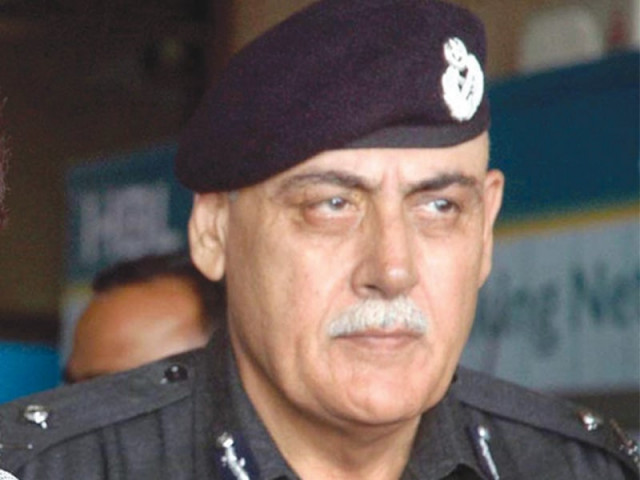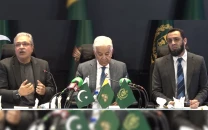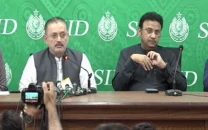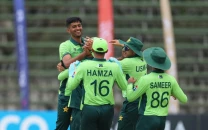Karachi violence case: SC assures support ‘against pressure’ to Sindh police chief
IGP Durrani complains of Rangers’ uncooperative attitude.

The Supreme Court resumed hearing of the Karachi violence suo motu on Monday by extending full support to the Sindh police chief but warned him that he is ‘running out of time’.
The court’s suo motu notice, now in its third hearing, came after three months of unabated violence in the metropolis that killed over 400 people. In earlier hearings, the court had grilled the IGP, calling his two-hour presentation ‘no better than a newspaper report’.
Testifying before a five-member bench, Inspector-General of Sindh Police (IGP) Wajid Ali Durrani complained of lack of cooperation by the Rangers, saying information is not shared. “Rangers have not turned over the men they had arrested during raids. The arms recovered have also not been handed over to us and the Rangers are interrogating those in their custody,” he said, responding to the court’s query on the progress on interrogating 18 men who had managed to flee their kidnappers.
Who has the ultimate command, Chief Justice Iftikhar Muhammad Chaudhry inquired, directing the IGP to make an effort to liaise closely with the Rangers director-general.
It is mine, Durrani said, but added that under a notification issued by the Sindh government on July 8, Rangers were allowed to go to any place independently and a deputy inspector-general was supposed to assist them.
Have you found any torture cell, the CJ then asked, to which the IGP responded that five target killers had been arrested in as many days. “You should conduct across-the-board raids all over the city,” the CJ said, specifically naming the areas of Old Sabzi Mandi, North Nazimabad, Landhi and Korangi.
The CJ also directed Durrani to make a chart of who had killed whom, saying that otherwise these killers could be freed from courts [for lack of evidence].
Speaking about failure to prosecute killers, the CJ criticised media coverage saying that televised interviews of alleged target killers is not a good trend. “You spoil the entire case by showing these men on television screens and later they retract [their statement]. Such confessions should be made before a magistrate,” he said.
The court then referred to reports by Joint Investigation Teams and Justice Amir Hani Muslim inquired about the progress that has been made in light of the reports’ findings.
Durrani said that SHOs have been asked to make arrests and those named by the JITs are on the police’s list.
The bench then asked the names of police officers assigned to arrest the killers named in the reports. “I came two months ago and concentrated on interior Sindh. The happenings in Karachi wipe out all our efforts,” Durrani said. “Officers posted as SHOs do not even know the area under their jurisdiction.”
The CJ then told Durrani that it was time to ‘deliver’. “Tell us if you are under pressure from any quarter. We are backing you,” the CJ said, asking him to present officers who had been sidelined.
The court then asked the IGP to provide DVDs and YouTube video clips, showing torture cells and killers drilling their victims, and the Sindh attorney-general was asked to arrange for a screening on Tuesday.
Stakeholder testimonies
Earlier, the bench heard Awami National Party (ANP) counsel Barrister Iftikhar Gilani who said that police and Rangers had pulled up their socks after the judiciary decided to intervene.
In a bid to dismantle the case built by Sindh government counsel Abdul Hafeez Pirzada, Gilani said that it was unfortunate that the government called the situation in Karachi ‘ethnic strife’. “We are all Urdu-speaking. The constitution of Pakistan makes it imperative that Urdu, being the national language, should be the language of all citizens,” Gilani pointed out.
In a surprise move, Gilani submitted a copy of a JIT report on an alleged target killer Muhammad Ajmal which he said was prepared by eight top intelligence agencies. “This report was available to police and law enforcement agencies but nothing was done. The government has the capacity but not the will,” he said.
What about reports from other investigation teams, asked Justice Sarmad Jalal Osmany, to which Gilani said it is the government’s duty to bring all reports before the court. The ANP counsel also suggested that the court pass only an interim order, which will keep things under control in Karachi.
Published in The Express Tribune, September 6th, 2011.


















COMMENTS
Comments are moderated and generally will be posted if they are on-topic and not abusive.
For more information, please see our Comments FAQ